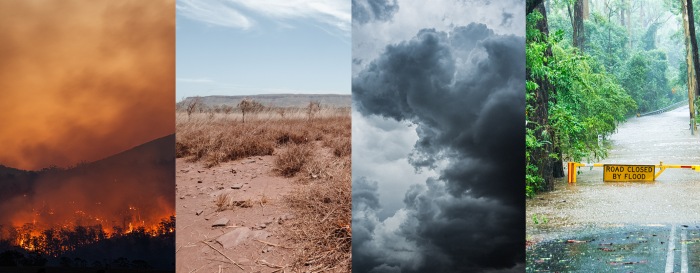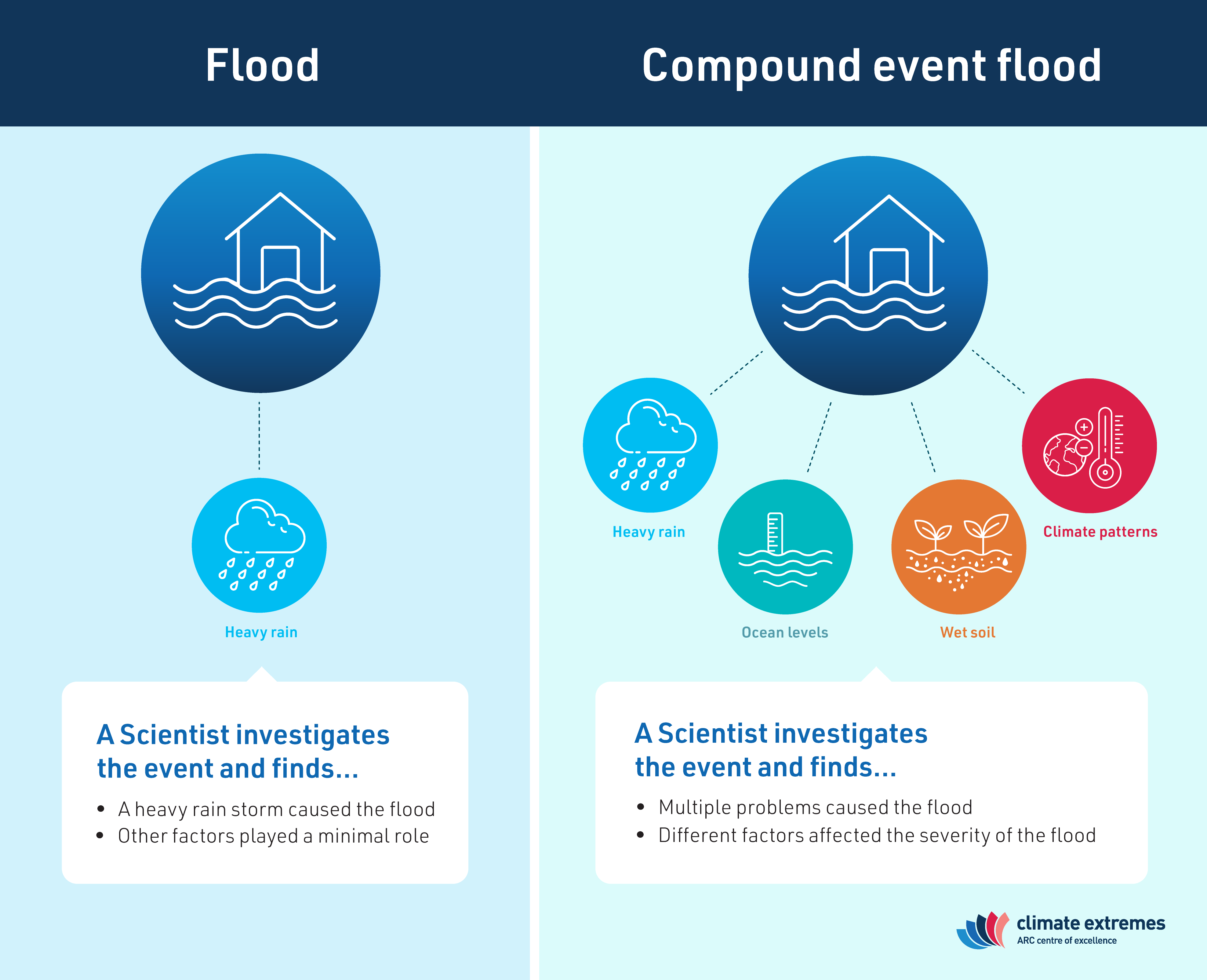Jonathan Brown with Centre researchers.

Storms, droughts, floods and fires can become compound events.
People across the planet are impacted by storms, droughts, heatwaves, floods and fires every day.
When a really bad weather or climate event happens, sometimes scientists call it a compound event.
A compound event is when bad weather and climate events combine together.
A compound event is like going to the doctor with a rash.
A rash could be a simple problem. Maybe you changed your laundry powder and your skin had a bad reaction. That would be a simple problem, with a simple solution. Change your laundry powder!
A compound event in weather and climate is like going to the doctor with a rash, but the doctor finds out the rash is a mix of your diet, your medication and an allergy at the same time!
All these different problems are giving you a painful mega-rash! The doctor has to investigate each problem causing your mega-rash.
Compound events in weather and climate are similar.
What do climate scientists mean when they say compound event?

A flood might be worse because you had really bad rain a few months ago. The soil could still be wet, causing floods, because the soil can’t take more rain.
Bushfires could be worse because you’ve had a heatwave and everything is too dry. A thunderstorm then comes and lightning sparks fires. The winds from the storm make the fire worse too.
One cyclone would be bad, but imagine if you experienced 3 cyclones in a week! Your community wouldn’t have time to recover.
These would be compound events.
When you visit the doctor for your mega-rash, it’s their job to help. They need help from other experts to fix it.
You wouldn’t want your doctor to give you a medicine that accidentally makes your rash worse!
It’s important that scientists research and understand compound events.
Scientists who research compound events work in a similar way to your doctor.
They rely on and work with other scientists to diagnose what caused the compound event.
For a flood that might mean:
- A rain expert researches why it rained so much.
- A soil expert researches why the soil couldn’t take more water.
- A computer and maths expert calculates whether these kinds of flood might happen more often.
- Another scientist compares the different research to make sure we know how to deal with the next flood.
Storms, droughts, heatwaves, floods and fires are already devastating for our communities. People might die or get hurt. You might lose your home. Your community might struggle to recover.
When they become compound events, these impacts are even more devastating – which is why we need scientists who look at the big picture.
Climate science helps governments and communities prepare for extreme weather and climate events. Improving our understanding of compound events is important for helping us protect our family, friends, homes and environment.
The ARC Centre of Excellence for Climate Extremes investigates compound events and leads research into what makes them happen and how they might change in the future.
What do compound events mean for Australia?
Australia has experienced a number of “compound events”.
The Australian Government’s State of the Environment report says compound events are a big challenge for emergency services.
“Climate change is expected to increase the risk of several natural hazards. Heatwaves and extreme fire weather are expected to become more common; extreme rainfall is expected to become more likely in many parts of the country; and higher sea levels are likely to increase hazards in coastal areas. This potentially increases losses as a result of natural hazards, as well as creating additional stresses on emergency management. Compound events, or coincident events in different parts of the country, are particularly stressful for emergency management capacity.”
Trewin B, Morgan-Bulled D & Cooper S (2021). Australia state of the environment 2021: climate, independent report to the Australian Government Minister for the Environment, Commonwealth of Australia, Canberra, DOI: 10.26194/rdze-5d59.
An example compound event: Flooding in Queensland and New South Wales, February and March 2022
The extensive flooding affecting Queensland and New South Wales in early 2022 shows many characteristics of a compound event.
Extreme rainfall fell on areas that were still wet from previous rains, making the floods worse.
In New South Wales, one weather system started the extreme rainfall, followed shortly by another which triggered most of the flooding. Both systems caused onshore winds that made sea levels higher along the coast. This hindered flood waters draining into the ocean, making things worse.
The fact that multiple places (e.g. Brisbane and southern Queensland, northern New South Wales and Sydney) were affected at the same time can also be a compound event.
Australia needs more research to understand compound events.
As the State of the Environment Report states:
“Climate change is already having – and will continue to have for the foreseeable future – an impact on extreme events. The consequences can have very long-lasting and sometimes irreversible effects. The frequency and intensity of extreme weather–related events are changing. By definition, extreme events are uncommon, but modelling based on historical and archaeological events and climate scenarios suggests an increasing intensity and frequency of many extreme events, a potential expansion in their distribution, changes in their duration, and increasing complexity of linked impacts. Some events, such as tropical cyclones and east coast lows, are likely to become more intense but less frequent.”
Metcalfe DJ & Costello O (2021). Australia state of the environment 2021: extreme events, independent report to the Australian Government Minister for the Environment, Commonwealth of Australia, Canberra, DOI: 10.26194/316q-pv32.
When it comes to compound events, more research is vital, because we still don’t know enough about the combinations of weather and climate extremes that could impact Australia into the future.
We expect extreme weather and climate events to change in frequency and severity as the planet warms under climate change. While climate models (the calculations that help us predict the future climate) are getting better every year, we need to know more about compound events to improve these predictions and help communities prepare.
Want to know more? For those who know a little bit of science, you may enjoy our briefing note, which gives more detail on the science of compound events:
